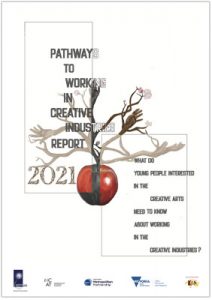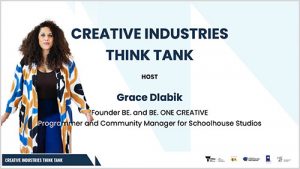Creative Industries
Quick links:


CREATIVE INDUSTRIES FOR YOUNG PEOPLE
For young people, the transition into creative work is not a solo journey. Creative Industries are different from other sectors. Obtaining Certificates and formal credentials are less important than accessing networks and contacts. Mentors, teachers and others play key roles in coaching young people in the creative arts and providing access to creative networks and industries.*
* "Young People’s Transitions into Creative Work", Julian Sefton-Green, S. Craig Watson and Ben Kirshner, Routledge (2019)
BACKGROUND
For young people, the transition into creative work is not a solo journey.
Creative Industries are different from other sectors. Obtaining Certificates and formal credentials are less important than accessing networks and contacts.
Mentors, teachers and others play key roles in coaching young people in the creative arts and providing access to creative networks and industries. *
This Project was developed to engage young people in co-designing a recovery strategy for those wanting a career in the creative industries during the COVID pandemic.
Built on youth-led research, this Project provided the opportunity for students enrolled in Arts and Design at Northern College of the Arts and Technology (NCAT) to research employment in relevant creative industry/industries.
Interviews provided opportunities for young people to make meaning from conversations that offered insights into how connections and access to industry professionals help to identify diffuse and hidden networks.
* “Young People’s Transitions into Creative Work”, Julian Sefton-Green, S. Craig Watson and Ben Kirshner, Routledge (2019)
PROJECT BACKGROUND
Over the past 2 years, the Covid19 global pandemic has had a significant impact on the creative industries sector in the northern region of Melbourne.
In partnership with Northern Metro Partnerships, NorthLink and NCAT we initiated a youth led project to unpack what would help young people who are entering the creative industry sector for the first time.
This Project was developed to engage young people in co-designing a recovery strategy for those wanting a career in the creative industries during the COVID pandemic.
This Project provided the opportunity for students enrolled in Arts and Design at Northern College of the Arts and Technology (NCAT) to research employment in relevant creative industries.
Online interviews provided opportunities for young people to make meaning from conversations that offered insights into how connections and access to industry professionals help to identify diffuse and hidden networks in the sector.
The following graph shows Creative Industry employment by LGA in Melbourne's North
The Project was developed to assist young people transition into the Creative Industries which has been significantly impacted by the pandemic.
In Melbourne's North, employment in the sector is concentrated in Darebin and in Moreland.
In Moreland, Creative Industry employment has declined significantly over the two years of the pandemic, while in Darebin it held up in the first year, but has declined in 2021.

WHAT DOES THE PROJECT INVOLVE?
The project involved a combination of research and explorative investigation activities that saw students participate in;
- Tours to Creative Spaces in the North (Collinwood Yards, Siteworks, Schoolhouse Studios, etc) to allow students to appreciate the opportunities and support networks available
- Online interviews with working creative professionals to discuss their experiences and identify the kind of support that assists young people seeking to enter the industry.
- Regional events provided the opportunity for local governments, arts professionals, community agencies and teaching practitioners to consider the findings of the student-led research, and strengthen existing networks and promote collaboration to support young people.

WHAT DOES THE PROJECT INVOLVE?
HEAR FROM THE STUDENT'S INVOLVED
NCAT Student, Fred Wild, outlines the project aims and learning outcomes.
NCAT Student, Emilia De Platter, discusses her experiences working on the project as part of the research team and how the youth-led process supported her learnings.
FINDINGS OF THE STUDENT LED RESEARCH

6 KEY THINGS YOUNG PEOPLE FOUND:
1. People are generally happy to help - don't be afraid to reach out
2. Offering to assist, volunteering, work experience - all open doors and indicate interest and enthusiasm.
3. Work comes through your networks - opens up opportunities
4. Think of networking as 'finding your community' - lead to unexpected outcomes
5. Develop new skills (esp. other artforms) to extend your creative range - provides more opportunities
6. Many creative people are self-employed, so either develop business skills or find people who can provide this support
Read more about the project findings in the Pathways to Creative Industries Report, including recommendations for further action endorsed by young people.
MEET THE STUDENT RESEARCH TEAM

The student research team consists of Year 11 VCAL/VCE VM & Year 12 Arts and Design students from Northern College of the Arts and Technology (NCAT).
The students were organized into Music, Photography and Visual Arts teams.

Meet the Student Research Team - 2021
Meet the Student Research Team - 2022

STUDENT DESIGN CONTRIBUTION
Project collateral including project identity, Think Tank flyer and Report cover design was created by NCAT student Angelique Rebillard.
Angelique describes how she approached the design for this project;
"Connecting young people to creative industries", I wanted to show the way how many of us stems from the same place of knowledge and go off to accomplish different things. Some of us choose more than one path and others are set on just one. Being in this community in youth there are so many choices to be made and it helps when someone from the same community lends a hand to nudge you in the right direction. You can be in the right place until a new pathway begins to grow and then that becomes the right place. There is no limit to growth when it comes to the creative arts.
INDUSTRY PROFESSIONAL INTERVIEWS

The student research team conducted online interviews with working creative professionals to discuss their experiences, and identify the kind of support that assists young people seeking to enter the industry. The questions used for the interviews were co-designed with the students and focussed on the following:
- What are the things you need to know to be able to work in the industry (apart from developing the necessary technical skills)?
- How are opportunities created and identified?
- What advice would you give a young person trying to enter your industry?
- What would have helped you, when you were getting started?
- How has COVID shaped how you work?
Listen to the complete online interviews conducted by students with the following creative professionals who supported the project.
2021 INTERVIEWS
VISUAL ARTS
BILLY SULLIVAN - Grease Monkey Games Design
ARRAN POTTER - Grease Monkey Games Design
CLIVE HAMBLY - Games industry artist and art designer
JOSEFINA BARCELO - Graphic Artist and Ceramicist
NERISSA BOX - Studio Manager, Creative Technologies
SAM KNIGHT - Character Designer / Animator
PAINK - Visual Brand Designer / Street Artist
LEIA ALEX - Graphic Designer / Festival Coordinator
GEORGIA MACGUIRE - Artist
STEPHEN ARMSTRONG - Artist
PHOTOGRAPHY
JESS APAP - Freelance Commercial Fashion Photographer
ERIC JONG - Ethno-photographer
MIA RUSH - MIFF Short Films Manager
TOM GOLDNER - Photographic Fine Artist / commercial photographer
CAITLIN OGRADY - Photographic Agency and Studio Owner
SIMON AUBOR - Ethnographer / Moreland Project Photographer
MUSIC
ROBIN FOX - Composer
DAN MIZZI - Musician / Teacher
JAMES RALPH - Film Music Composer
GEORGE PAPANICOLOU - Film Music Composer
MICHAEL PAYNTER - Producer / Songwriter
MICHAEL DELORENZIS - Production Company
KISHNEL CHAND - Studio Production
AMAN BAYATLY - Studio Production
CHRIS PICKERING - Musician

2022 INTERVIEWS
VISUAL ARTS
JOSEFINA BARCELO - Graphic Artist and Ceramicist
NERISSA BOX - Studio Manager, Creative Technologies
LEIA ALEX - Graphic Designer / Festival Coordinator
2023 INTERVIEWS
VISUAL ARTS
ROSIE TURNER - Artist & Designer
JOSEFINA BARCELO - Graphic Artist and Ceramicist
LEIA ALEX - Graphic Designer / Festival Coordinator
RACHEL DERUM - Analogue paper collage Artist
SOULA MANTALVANOS - Artists & Designer
THEO MANTALVANOS - Queenscliff Gallery Director
ANNA CLABBURN - Visual Artist & Hume Arts & Culture Community Development Officer
AYLSA MCHUGH - Visual Artists
GABE FREEMAN - Costume and Prop Designer
SARAH DOYLE - Visual Artists
AOIFE BILLINGS - Visual Artists
ANNA CLABBURN - Visual Artist & Hume Arts & Culture Community Development Officer
THINK TANK

The Creative Industries Think Tank was held on Thursday 7th of October over Zoom, and attended by 70 students and 80 local governments representatives, arts professionals, community agencies and teaching practitioners.
Hosted by Grace Dlabik, Founder of BE. and BE. ONE CREATIVE Programmer and Community Manager for Schoolhouse Studios, the Think Tank provided the opportunity for students to present the findings from the completed research, strengthen existing networks, and promote collaboration to support young people.
Think Tank Guest Speakers
- Terry Larkins - Chair of Northern Partnerships
- Jamie Lewis -CEO of Next Wave
- Caitlin O’Grady - Owner of Desfura Studio
- Hollie Fifer - SchoolHouse Studio/Film-maker
- Bennett Fergusson - Marshall Street Studios
- Emma Ismawi - Visual designer
- Aretha Brown - Artist & former Youth Prime Minister
Special thanks to the following:
We would like to acknowledge the following contributors to the Project.
The Student Research team
The NCAT staff who, along with the Principal, Raffaela Galati-Brown, helped to facilitate the involvement of the students as well as providing access to their industry contacts and NCAT Alumni.
Zac Lister (Music), Shelley Scown (Music), Imogen Oke-Janetzki (Design), Suzanne Blackburn (Visual Arts), Tracy Paterson (Visual Arts), Irene Alessandro (Photography), Ali McCann (Photography), and Kylie O’Malley (Arts Immersion), Mark Russell, and Peter Myers.
The Youthworx staff, Shardae Grenfell, Ben Noonan and Kelly West who took on the mentoring component of the project at short notice.
The Northern Partnership:Terry Larkins (Chair of the Partnership); Helen Coleman (Deputy Chair of the Partnership), Brendan Phillips (Department of Jobs, Skills, Industry and Regions), Fiona Florakx (Department of Jobs, Skills, Industry and Regions) and Elizabeth Ryan (Department of Jobs, Skills, Industry and Regions)
The Project Steering Committee: Peter Hille and Committee Members
Syed Asad Taqvi (Northern Partnerships Members), Nicholas Verginis (Northern Partnerships Members), Ben Rodgers (Inner North Community Foundation), Stephen Joyce (NORTH Link), Beau Mc Cafferty (Darebin City Council), Rebeca Sacchero (Darebin City Council), Hiroki Kobayashi (Banyule City Council), David Henry (Hume City Council), Feyza Yazar (Hume City Council), Jamie Lewis (Next Wave), Kate Spear (Youthworx), Shardae Grenfell (Youthworx) and Raffaela Galati-Brown (NCAT).
PROJECT PARTNERS
We take this opportunity to thank our key funding partners for their support in the development of the Creative Industries Project.




